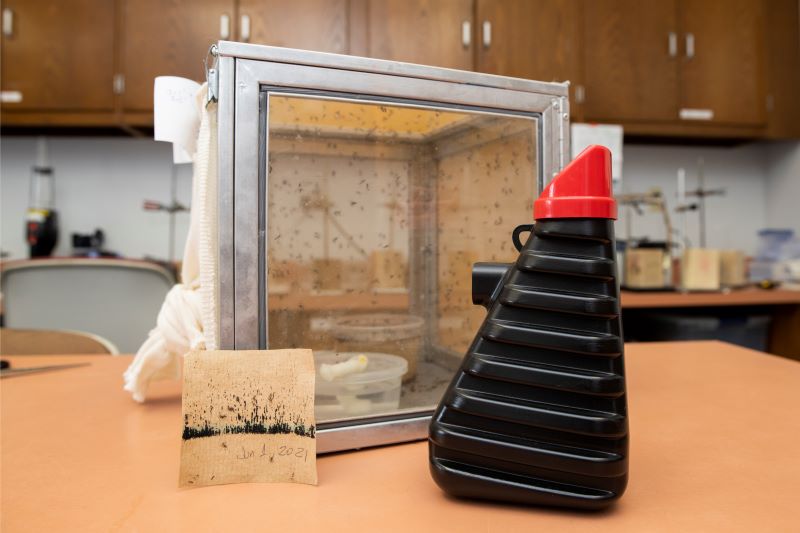Shift in Florida’s Lizard Population Could Influence Spread of Mosquito-Borne Diseases, UF/IFAS Scientists Probing Impacts
A team of UF scientists is looking to unveil the implications of a battle between two lizard species that influence the spread of mosquito-borne diseases in Florida.
UF/IFAS Scientists Seek To Lure Mosquitoes, Build Better Surveillance System for Southeast Region With USDA-NIFA Grant
Mosquitoes’ sense of smell tells them when humans and wildlife are in biting distance, according to science. Over time, scientists have learned which types of scents and fragrances can lure mosquitoes best.
Over the next two years, a team of researchers from the University of Florida Institute of Food and Agricultural Sciences (UF/IFAS) will develop a low-cost mosquito trap to lure mosquitoes and create a web-based dashboard to improve surveillance across the southeast United States.
Orange County Hands Out Thousands of Free Mosquito Traps
Last month, Orange County Mosquito Control identified approximately 93,000 acres that are seeing more mosquitoes. Because of that influx, the county and the University of Florida’s Institute of Food and Agricultural Sciences are handing out free mosquito traps.
The traps were invented in a UF lab. And the company that now sells them, Inzecto Mosquito Trap, donated 100,000 traps to hard-hit communities impacted by hurricane Ian. 9,000 of those traps went to Orange County.
UF Start-Up Helps Fight Mosquitoes in Areas Hit Hardest by Hurricane Ian

A product developed in a University of Florida lab designed to protect American soldiers from insect-borne diseases is helping wage war against the surge of mosquitoes in areas hardest hit by Hurricane Ian.
The Inzecto Mosquito Trap, co-created by Phil Koehler, a UF distinguished professor in the department of entomology and nematology, is an easy-to-use, environmentally friendly, and effective mosquito-killing device. The Gainesville-based company donated 100,000 traps this week to communities struggling with large populations of mosquitoes due to the floodwaters left behind by the hurricane’s rain and storm surges.
UF-Led Center Continues Fight Against Diseases Spread by Mosquitoes, Ticks
Established in 2016, the Southeast Regional Center of Excellence in Vector-Borne Disease: The Gateway Program (SECVBD) will continue its work for another five years, thanks to renewed funding from the Centers for Disease Control and Prevention (CDC). “The center is a team effort to help communities prevent, prepare and respond to vector-borne disease threats through applied research and education efforts. We look forward to continuing to inform these public health actions,” said Rhoel Dinglasan, the center’s director and a professor in the University of Florida College of Veterinary Medicine affiliated with the UF Emerging Pathogens Institute.
Atlantic Beach Trying Traps Designed for Military To Swat out Mosquitos at Local Parks
Mosquito season is here, and it’s only going to get worse as we head into the wetter months. Before it gets too bad, one local city is taking steps to take out as many mosquitos as it can. Crews are putting up INZECTO mosquito traps in Atlantic Beach that were actually created by a University of Florida professor.
Mosquitoes That Transmit West Nile Virus Love To Bite Non-Native Lizards: What’s Next?
A new study published in Frontiers by faculty at UF/IFAS Florida Medical Entomology finds that Culex mosquitoes prefer to feed on lizards. This finding might help researchers find ways to reduce the number of West Nile-carrying mosquitoes within an ecosystem.
UF/IFAS Researchers Explain Science Behind Genetically Modified Mosquitoes
South Florida residents seeking science-based information about genetically modified mosquitoes can access a new, online resource from University of Florida scientists at the UF/IFAS Florida Medical Entomology Laboratory.
Does Paternal Health Status in Mosquitoes Influence Maternal Offspring Results?
Scientists at the University of Florida Institute of Food and Agricultural Sciences are one step closer to learning the factors that ultimately lead to characteristic differences in mosquito offspring—a key takeaway in the make-up of mosquito species and a critical finding in the continued research of mosquito-borne illnesses.
